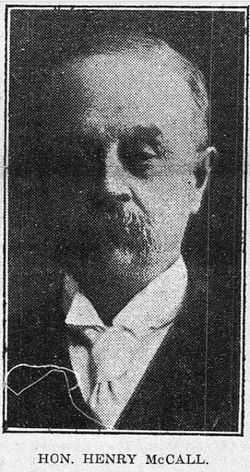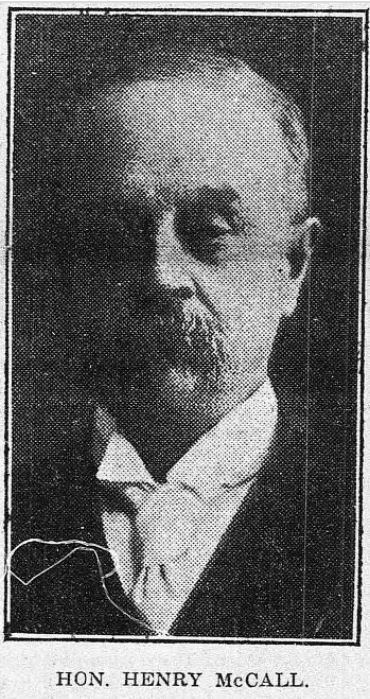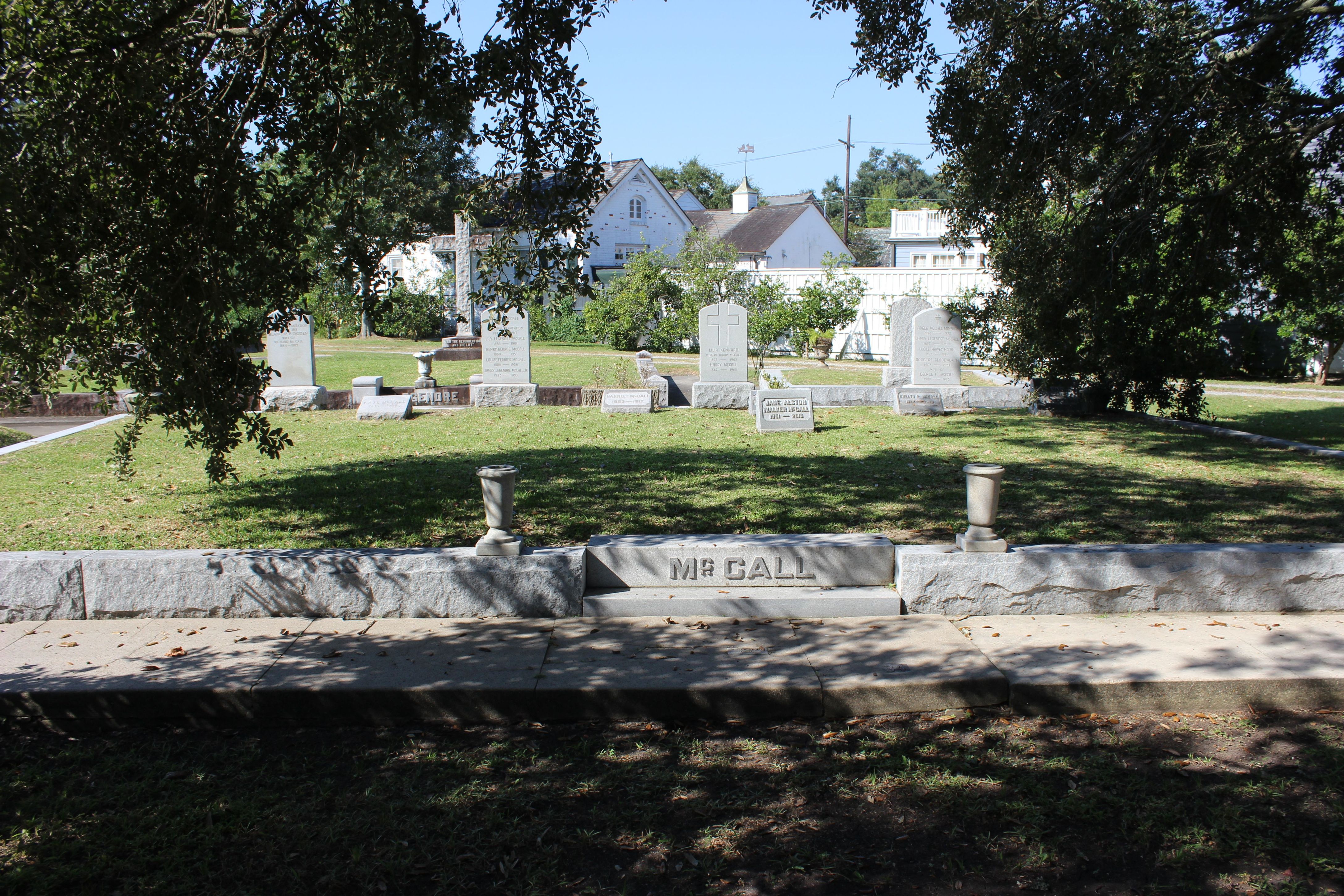Military information provided by Sons of Confederate Veterans
"McCALL - At 6023 Prytania Street, on Wednesday, Jan. 1, 1913, at 0:45 o'clock a.m., HENRY McCALL, in his sixty-sixth year. Friends and relatives are invited to attend the funeral services, to be held This (Thursday) Morning, at 10 o'clock, from the Church of the Holy Name of Jesus (Little Jesuits'). Interment private."
Obituary - The Times-Picayune (New Orleans, LA), 2 January 1913; page 2
Henry McCall is a typical Louisiana planter, substantial, enterprising and progressive, and such a man as wields no small influence in the community where he makes his home. He was born in Assumption parish in 1847, received a common-school education in Maryland, but at the breaking out of the war, when only thirteen years of age, he was sent to Europe to complete his education, attending noted colleges in both France and England. Leaving the schoolroom he went to Liverpool, entered an office in that city and there remained two years or until 1867, when he returned to the United States. He entered a cotton broker's office in New Orleans, continued here two years, and then assumed the management of Evan Hall plantation, consisting of 3,500 acres with 2,500 acres under cultivation. In 1891 he made 4,500,000 pounds of sugar, having not only doubled the acreage, but quadrupled the production. He is the owner of about 200 head of mules, and employs about 300 hands on the plantation. About two-fifths of the land is worked on the gang system and the remainder by tenants. A large sugar mill on the place turns out about 100,000 pounds of sugar per day, and during the last year 36,000 tons of cane were handled. Mr. McCall is also running a large general store on the same plantation, carries a stock of goods valued at about $5,000, and the annual sales equal $4,000. Mr. McCall was married in 1877 to Miss Legendre, from St. James parish, La., and daughter of E. Legendre, who is now deceased and who was a large planter in St. James parish. To Mr. and Mrs. McCall have been born three interesting children, two sons and a daughter. Mr. McCall's father, Even Jones McCall, was a native Philadelphian, born in 1824, and was a graduate of Princeton college. He also attended Yale college, and was a man of education and learning. He entered the army, but on account of ill health was obliged to return home. His death occurred in 1877. His family consisted of two sons and a daughter, but only our subject and a sister are now living. The sister married Mr. Flower, a member of the firm of Flower & King. Even Jones McCall had two brothers, Harry and Richard, both of whom had an interest in the Evan Hall plantation, but Richard sold out his interest to Even and Harry, and the plantation it now carried on by our subject and the son of Harry. This plantation has been owned by the McCalls for four generations. A part of this tract was given to Even Jones by the Spanish government in 1780. He was a Philadelphian by birth, but was the American consul for the Spanish government.
He was also military commandant of this district, which was then called "Lafourca de Chetimachas," receiving the appointment on account of being a fine Spanish and French scholar. Our subject's grandfather, Henry McCall, was a soldier of the War of 1812, was with General Jackson in the battle of New Orleans and assisted in defending that city. He was a planter all this life and died in 1859. He was twice married and each time to daughters of Even Jones, thus showing how he came in possession of this fine tract. Even Jones died in 1823. Henry McCall is president of the police jury and is on the board of supervisors of the A. M. college, at Baton Rouge. He is also a member of the levee board, and was the first vice-president of the Louisiana Sugar Planters' association. He takes an active part in politics and, although urgently solicited to run for congress by his numerous friends, he refused, preferring rather to look after his extensive planting interests.
BIOGRAPHICAL AND HISTORICAL MEMOIRS OF LOUISIANA; 2 Volumes; Goodspeed Publishing; Chicago; 1892 Page 214.
provided by Find a Grave member #47112463
Military information provided by Sons of Confederate Veterans
"McCALL - At 6023 Prytania Street, on Wednesday, Jan. 1, 1913, at 0:45 o'clock a.m., HENRY McCALL, in his sixty-sixth year. Friends and relatives are invited to attend the funeral services, to be held This (Thursday) Morning, at 10 o'clock, from the Church of the Holy Name of Jesus (Little Jesuits'). Interment private."
Obituary - The Times-Picayune (New Orleans, LA), 2 January 1913; page 2
Henry McCall is a typical Louisiana planter, substantial, enterprising and progressive, and such a man as wields no small influence in the community where he makes his home. He was born in Assumption parish in 1847, received a common-school education in Maryland, but at the breaking out of the war, when only thirteen years of age, he was sent to Europe to complete his education, attending noted colleges in both France and England. Leaving the schoolroom he went to Liverpool, entered an office in that city and there remained two years or until 1867, when he returned to the United States. He entered a cotton broker's office in New Orleans, continued here two years, and then assumed the management of Evan Hall plantation, consisting of 3,500 acres with 2,500 acres under cultivation. In 1891 he made 4,500,000 pounds of sugar, having not only doubled the acreage, but quadrupled the production. He is the owner of about 200 head of mules, and employs about 300 hands on the plantation. About two-fifths of the land is worked on the gang system and the remainder by tenants. A large sugar mill on the place turns out about 100,000 pounds of sugar per day, and during the last year 36,000 tons of cane were handled. Mr. McCall is also running a large general store on the same plantation, carries a stock of goods valued at about $5,000, and the annual sales equal $4,000. Mr. McCall was married in 1877 to Miss Legendre, from St. James parish, La., and daughter of E. Legendre, who is now deceased and who was a large planter in St. James parish. To Mr. and Mrs. McCall have been born three interesting children, two sons and a daughter. Mr. McCall's father, Even Jones McCall, was a native Philadelphian, born in 1824, and was a graduate of Princeton college. He also attended Yale college, and was a man of education and learning. He entered the army, but on account of ill health was obliged to return home. His death occurred in 1877. His family consisted of two sons and a daughter, but only our subject and a sister are now living. The sister married Mr. Flower, a member of the firm of Flower & King. Even Jones McCall had two brothers, Harry and Richard, both of whom had an interest in the Evan Hall plantation, but Richard sold out his interest to Even and Harry, and the plantation it now carried on by our subject and the son of Harry. This plantation has been owned by the McCalls for four generations. A part of this tract was given to Even Jones by the Spanish government in 1780. He was a Philadelphian by birth, but was the American consul for the Spanish government.
He was also military commandant of this district, which was then called "Lafourca de Chetimachas," receiving the appointment on account of being a fine Spanish and French scholar. Our subject's grandfather, Henry McCall, was a soldier of the War of 1812, was with General Jackson in the battle of New Orleans and assisted in defending that city. He was a planter all this life and died in 1859. He was twice married and each time to daughters of Even Jones, thus showing how he came in possession of this fine tract. Even Jones died in 1823. Henry McCall is president of the police jury and is on the board of supervisors of the A. M. college, at Baton Rouge. He is also a member of the levee board, and was the first vice-president of the Louisiana Sugar Planters' association. He takes an active part in politics and, although urgently solicited to run for congress by his numerous friends, he refused, preferring rather to look after his extensive planting interests.
BIOGRAPHICAL AND HISTORICAL MEMOIRS OF LOUISIANA; 2 Volumes; Goodspeed Publishing; Chicago; 1892 Page 214.
provided by Find a Grave member #47112463
Family Members
Sponsored by Ancestry
Advertisement
Explore more
Sponsored by Ancestry
Advertisement








